Proper nutrition for weight loss begins to interest us the moment we realize that diets do not help. Diets do not help - this is a fact. Why The answer lies in those prohibitions and restrictions that are abundant in modern and well-known diets, "proven over the years". The right diet for weight loss should be varied, healthy and nutritious, no matter how strange it may sound. There are some basic principles of such a diet. And also a bunch of misunderstandings, misjudgments, stories about fantastic superfoods, blacklists of "harmful foods" as well as stories about their wonderful rehabilitation.

Before you start a conversation about nutrition, you need to understand that in recent years, more precisely, over the last 25-30 years, the balance of essential nutrients - proteins, fats and carbohydrates - has been quite skewed towards the carbohydrate component. At the same time, you do not need to get tired and count too much - just go to any store and look out the window with sweets. They occupy almost a quarter of the store space! And the first step to switching to a proper diet for weight loss will be a complete rejection of sugar in the daily diet. Sounds scary, right? Do you know why? Because sugar addiction is similar to drug addiction.
- Well, it started. . . - means someone with disappointment, - Again bans and restrictions!
A few minutes out of your attention, and you will agree that giving up sugar can be a giant breakthrough in improving body health and, consequently, weight loss.
We need carbohydrates, of course. But which ones? We’ve all heard of fast and slow carbs. We need the slow ones. Dishes made from cereals, wholemeal flour, vegetables. . . Fruits and berries are full of fast carbs, but it is better to eat fruits and berries than to buy cakes in the confectionery departments. Many nutritionists propose to resolutely and suddenly abandon carbohydrates, and of any kind, reducing their consumption to 20-50 g per day. Such a sharp transition from the usual to the useful can lead to dizziness, loss of energy, bad mood and the belief that it is not so useful and that it is the right food.
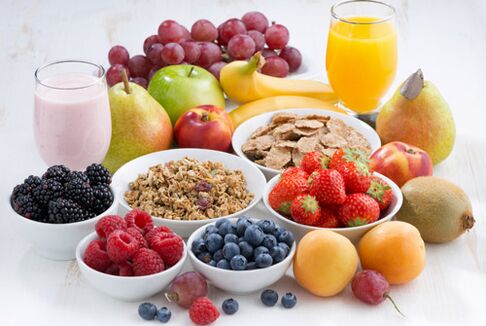
Proper nutrition for weight loss will bring much more benefit and joy if you switch gradually, continuously and do not make mistakes. But first you need to understand why our body so stubbornly resists any change, especially a drop in the amount of sugar.
Sugar is truly the scourge of our time. The few products offered to us in supermarkets also lack a teaspoon of sugar. Now we are not even talking about sweets! Juices, yogurt, marinades, sauces, semi-finished meat products, sausage and sausage, canned fish, instant soups, instant noodles. . . The list is almost endless! The most horrible next transition to new principles of nutrition - it turns out we have almost nothing to eat! Do not be afraid, there is a way out and it is quite peaceful.
Getting proper nutrition through your diet does not have to be complicated.
First step:remove the sugar in its pure form. Tea, coffee, sugar-free compote. We refuse stocks, jams, sweets, chocolates, cookies and other joys of drinking tea with friends or during a work break. Ice cream, sweets, and even low-calorie marshmallows are eco-communicated from our table! All carbonated drinks are prohibited. Try to stay sugar-free for two weeks, only two weeks - you will be surprised. Tea, it turns out, has different flavors. Coffee too. Cocoa with milk, but without sugar, loads better than any stimulant. And what should be served with tea? At this stage, nuts (not salty), dried fruit, energy mix with honey (a mixture of nuts and dried fruit, passed through a meat grinder, you can add lemon), sandwiches with butter (yes, yes! ), Cheese and normal sausage, and better with home-cooked pork, with caviar, lightly salted salmon, etc. At the same time, tea with all these good things should be included in breakfast, lunch or dinner and not be an ordinary snack. However, for snacks a little later.
Second step:When the body shifts from fast to slow carbohydrates, it is time to eliminate foods that have a high glycemic index: premium wheat flour, white rice and potatoes. That is, all buns, breads, pies, porridge made from peeled rice, oatmeal porridge, as well as favorite mango pies and potatoes of all kinds, are automatically transformed from everyday food into a dessert. Yes, and soups will now also be potato-free. At the same time, rye bread and bakery products made from wholemeal flour (no sugar, remember? ), Buckwheat steamed or simply poured with clean water overnight, instant oatmeal, they are very well mixed withfermented milk products as well as any exotic or forgotten cereals like quinoa, quinoa. In addition, you should remove frankly sweet fruits from the diet - bananas, grapes, pears. Berries are not included in this list due to their high acid content.
Step three:at this stage, you should abandon any carbohydrates, leaving only natural carbohydrates that are part of pickled vegetables and berries. However, sometimes the first two steps are enough to significantly reduce the weight. And if you meet several other conditions in parallel, then you will not have to look for a new diet for yourself - you will move to a whole new level, where the right food is first and foremost for life.
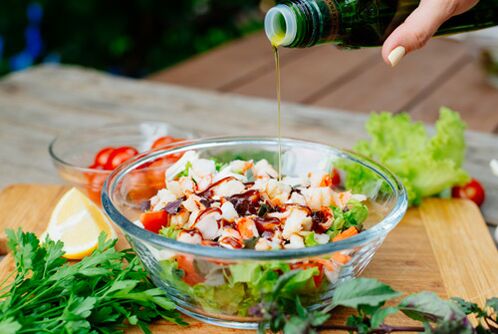
The right diet for weight loss should be varied.This means that the balance should include not only the infamous BJU (proteins, fats and carbohydrates), but also vitamins and trace elements. And if carbohydrates bring us energy in a pure, achievable form, then it is much harder for the body to get that energy from proteins, and even more so from fats. But, as is often the case, what is difficult to obtain is usually the most useful. Calories from carbohydrates are usually excessive, our body spends almost no effort on processing them, which is why "sugar calories" so quickly get into the role of cozy fat.
Proteins are vital to our body.Protein is important throughout life: in childhood it is a building material, in adulthood it is an element that helps our body function and maintain itself in the best way for as long as possible. Judge for yourself: protein performs a protective function, helping to produce antibodies, transport, the most famous protein hemoglobin supplies oxygen to every cell, regulator - normal hormone production is impossible without protein, motor - all kinds of movementprovided by the protein myosin and actin, plastic - collagen protein is responsible for the condition of connective tissue, the appearance of the skin, etc. , energy - proteins supply the body with energy. But perhaps one of the most important tasks of a protein is to store and transmit gene information. It is believed that the increasingly common terrible disease "Alzheimer's disease" is directly related to insufficient protein intake (not only with it, but also the second most important component slightly lower).
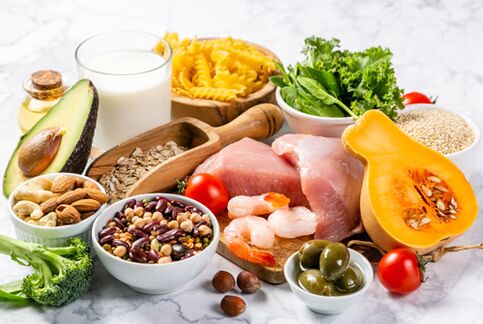
How much protein does the average adult need? Many nutritionists, doctors, and nutrition advocates adhere to protein intake norms, derived more than a hundred years ago by German scientist Max Rubner, and that rate was 0. 33 g protein per 1 kg of human weight. Many things have changed since then, science has advanced and recent studies have yielded an average rate of 1. 2 to 2. 0 g per 1 kg body weight. An impressive change. Moreover, these 1, 2 - 2, 0 g are not the weight of the product, say, a piece of meat or a piece of beans, but the content of pure protein in the product. An example table of high protein foods is available on our website. Our site has written about the benefits of protein products more than once, but it never hurts to repeat these common truths.
Despite the huge popularity of vegan, raw foods and vegetarian diets, we still need at least 50% animal protein to keep the body healthy and not in a state of survival. These are eggs, dairy products, fish and seafood, meat and offal. It is these proteins that have a complete set of amino acids, unlike plant foods. Although they should be eaten, if only because variety is the essence of proper nutrition!
It is clear that there are few products on our planet that are made up of any substance. Almost every food is a combination of proteins, carbohydrates and fats. And here with the last ingredient - fats - happened, perhaps, the greatest criminal history in the history of the science of nutrition. At a "perfect" moment, fats were declared enemies of health. Everyone has heard horror stories about cholesterol, plaques in blood vessels and other horrors. And watching stores replenish their assortment of low-fat or full-fat products at an enviable rate, you begin to doubt the sincere desire to feed us "correct, " "healthy, "alive ", because there is nothing correct and useful in the absence of fat in the diet.
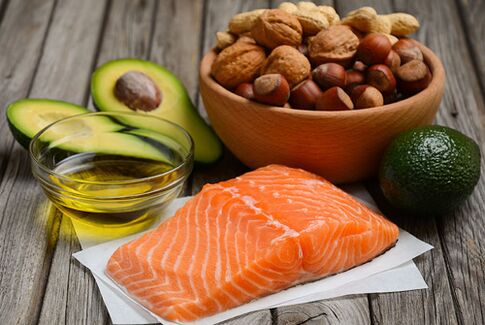
So what is the function of fats in our body? You will say - help assimilate fat-soluble vitamins. Is that all? From biology lessons from school days, one will recall the function of heat exchange of fats. So the most important function of fats in the body is suffocation metabolism, that is, in simple terms, ensuring oxygen exchange in the alveoli of the lungs. Fat lining the walls of the alveoli in a thinner layer and allows us to breathe and. . . to live. My grandmother's methods of treating lung disease immediately come to mind: badger fat, dog fat, goose fat, hot milk and butter - wherever there is fat, inside and out, and it helped! And, by the way, it still helps, only the drugs for treating hypoxia (oxygen starvation), which are now sold for wild money, in fact, is a fat emulsion. Another important function of fats is the synthesis of membranes. The cell membrane is made up of 70-85% fats, and the function of the membrane is to provide cell protection, thermal insulation, and selective permeability (as not everything that seeks to enter the cell is useful and necessary for it). The myelin sheath, this insulating envelope of our nerves, is 70-80% saturated fat. Not myelin - get Alzheimer’s disease, senile sclerosis (much younger) and dementia. Fat is one of the most important vital substances for building membranes, myelin sheath, ensuring their work, as well as the functioning of the central and peripheral nervous system. Remember this when choosing between 0, 5 and 3, 2% fat milk.
Another important function of fats is hormonal. It is the fats that are the sources for the synthesis of hormones and there are many of them in our body. These are growth hormones, protein hormones, thyroid hormones, digestive hormones, steroid hormones, adrenal hormones, sex hormones, and so on. It is clear that the slightest prejudice, the underproduction of any hormone threatens major disruptions in the work of the whole organism. A sudden attack of blackheads and acne, all kinds of skin rashes are a sign of low androgen levels. Frequent headaches "for no reason" can be a sign of low estrogen levels. Persistent insomnia - not enough progesterone. Fatigue, exhaustion and even fatigue even at rest can be signs of impaired thyroid hormone production. Hair loss is also a sign of this disorder. Weight gain may be due to high levels of the hormones estrogen, cortisol and insulin, accompanied by low levels of testosterone. Oblivion and distraction are indicators of low estrogen and cortisol levels. How everything is connected!
Fats are responsible for regulating heat. This is why men who do not diet are often hotter than women who always lose weight. Constant freezing of the hands and feet will most likely be a sign of a lack of fat, if it is not some kind of congenital feature. The most famous function of fats is digestion and helps absorb fat-soluble vitamins: A, E, D, K. Sitting on a low-fat diet and drinking vitamin complexes - not an option, vitamins just will notabsorbed.
And finally, last but not least - vitamins, minerals, macro and micronutrients. These substances are found in different amounts and combinations in all products, but special attention should be paid to fresh vegetables, roots, fruits and berries. One of the most valuable vitamins - vitamin C - is not synthesized in our body and we can only get it from fresh plant products. Our site has filled an entire section about vitamins, read it, it is useful! Plant foods contain enzymes and flavonoids, all kinds of minerals, without which we simply can not function normally. For example, potassium - the work of the heart without it will be broken. Magnesium is responsible for the health of the brain, nervous and hormonal systems and is involved in metabolic processes. And also in plant products there is fiber - without it, the processes of digestion and peristalsis are almost impossible!
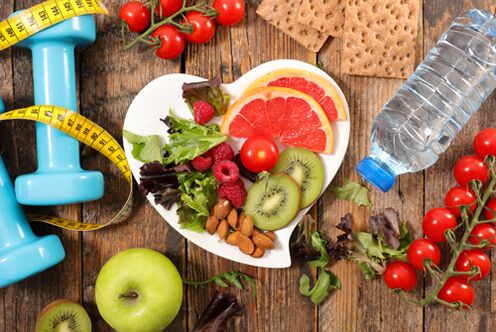
Proper nutrition for weight loss and improvement of the body includes the following principles:
Eat no more than three times a day. Unexpected, right? But what about 5-6 meals a day, advertised in many recommendations? Such fractional foods are perfect for children, athletes and seriously ill citizens. If you are not in any of these categories, eat three or even twice a day.
Eat only when you feel hungry, not at night. Breakfast is optional! If you do not like to eat breakfast, reschedule breakfast a few hours later. Do not include food in yourself just because someone said that breakfast is the most important thing.
Learn to listen to yourself and understand the difference between hunger and the usual habit of mixing something in between. The following recommendation will help with this.
Drink water. Not in liters, as is sometimes advised. Jo i zier. In bottles or spring. The drinking regime is simple to be ashamed of: 2 cups lukewarm (not cold and not boiling water) in the morning, 1-2 cups during the day and 1 in the evening. Sometimes it is enough to drink water to realize that it was simply thirst, not hunger.
Get in the habit of buying all kinds of nuts and seeds more often. In addition to fats, they contain a large amount of macro and micronutrients.
Eat whole foods. That is, not fat-free! Cottage cheese - 9% fat, no less, but with sour cream, coffee with cream, sandwiches with butter, fatty cheeses, fatty seafood, exotic avocados, bacon! This is not a typical "fire to fire" deviation. Of course a measure is needed in everything.
Do not forget about protein! But no less important is what to combine it with. And this recommendation will be the last.
Ha perime. Lots of vegetables and herbs. Fresh, pickled, pickled, steamed, boiled and even fried in oil! But fresh salads are certainly preferable. It is not difficult to calculate the amount of vegetables: mentally divide your dish into two parts - half will be occupied by vegetables, and the second will fit proteins, fats and the same allowed minimum of carbohydrates.
Proper nutrition for weight loss is not strict table and recipes. This is a deliberate approach. All of these tips will only work if there is an almost complete rejection of carbohydrates. If you combine protein with carbohydrates (mashed potatoes with a kitten) or fats with carbohydrates (bacon with bread) in one dish, you are done. More precisely, no, of course, you will not die right away. You will simply live, sighing punishment for every new kilogram and complaining about injustice ("I am literally sitting in the same water, where does the fat come from??? "). No need to sit in the water, no need to torture yourself with hunger, diet products. Just start with three steps and walk, going nowhere, to health and beauty.














































































